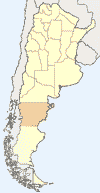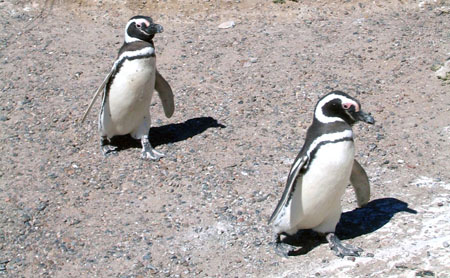
| « Heist! | Two Dinosaurs » |

The flight from Buenos Aires to Trelew takes only a little over an hour, but you feel like you've arrived on another planet. Instead of an endless urban landscape that transitions into an even more endless coastal lawn, you find yourself in the middle of an arid plain that looks like a cross between northern Scotland and Nevada. The plane lands in a stiff crosswind and pulls up to the only building visible in any direction, a tiny airport terminal with an incongrous Welsh welcome lion on the front. After spitting you out onto the gale-swept tarmac, the plane scoots over to a little filling station and then immediately flies off to somewhere more populous and less gusty, leaving you on your own in an absurd excess of open space. Welcome to Patagonia.
Chubut  is an Arkansas-shaped province of Argentina that is a little bit smaller and less populous than the state of Wyoming. The province is a horizontal slice through Patagonia - the region starts far to the north in Rio Negro, and extends all the way down to the southern tip of the continent.
is an Arkansas-shaped province of Argentina that is a little bit smaller and less populous than the state of Wyoming. The province is a horizontal slice through Patagonia - the region starts far to the north in Rio Negro, and extends all the way down to the southern tip of the continent.
Trelew and the associated group of towns around it (Gaiman, Rawson, Dolavon, Trevelin) lie up in the northeast corner of Chubut. They owe their strange names to the Welsh settlers who showed up here about the time of the American Civil War, looking for a place where they could be away from Englishmen while still enjoying the kind of windy, miserable winters they had grown used to back in the homeland. The Argentine government of the time is partly to blame for the rough start the settlers had in Patagonia. In their haste to stress the many charms the province offered (sun-kissed summers, virgin land, distance from England) they skipped over certain inconveniences (barren waterless desert) that made the first few years in Argentina a real trial for the Welsh.
However, after a few miserable initial winters, the settlers managed to build an excellent irrigation system and actually begin growing some food. The colony may not have thrived, but it survived, and as late as the 1970's the Welsh influence on this part of Argentina persisted, with old-timers still speaking the language and keeping their distinct traditions alive. In 2006, all that seems to remain of the settler culture is an annual song contest, the beautiful canals, a well-developed tourist effort aimed at drawing people into the local teahouses and an extravagant number of Jones Streets.
Trelew is a pleasant town of about 80,000, with the obligatory Plaza San Martín and an mysterious profusion of ice cream parlors. It serves mostly as a transport hub for the local beaches and marine wildlife reserves, and is not shy about advertising its penguin connection - the birds are on display in every storefront, in photographic, cartoon, plush and schematic form. And penguins were what we had come to Trelew to see. The nearby colony at Punto Tombo is the largest on the South American continent, with over half a million Magellanic penguins coming ashore each year to relax, eat fish, and breed.

Anyone who found the family-values propaganda of March of the Penguins a little oppressive will feel an immediate affinity for the far more laid-back Magellanic penguin. Instead of trekking through seventy miles of Antarctic ice to rear eggs that it balances on its feet, this admirable bird simply swims ashore in the warm spring months, digs a hole under a Patagonian bush, and lies sleeping on its belly in the sun until its chicks hatch. The Magellanic penguin is about the size of a bowling pin, and has an elegant black stripe around its neck that looks like a necklace. Punta Tombo is about the nearest it ever comes to Antarctica. Winters are spent swimming and eating fish somewhere off the shores of Brazil.
Punta Tombo is a little penninsula jutting out of the Patagonian coast, and to the undoubted benefit of the penguins, it is not easy to get to. Like most roads in Patagonia, the one leading from Trelew is unpaved gravel. Even though the road is well maintained, with enormous graders riding through several times a day to comb it, the gravel still has a tendency to pool up in large swells between wheel tracks and make a horrible clattering and scraping sound against the belly of your car, which it attempts to spin. Passing oncoming cars (or buses, or tailgaters who illegaly overtake you) are even more nerve-wracking, since you never know what kind of large rock might come sailing through your windwhield.
For most of the drive down, the view consists of gravel road and nearly level, featureless scrubland. Once in a while an animal will pop out into the road - on our drive we crossed an armadillo, a number of rheas (flightless ostrich impersonators) and the better part of a herd of guanaco, an upscale wild version of the llama. From time to time you see a sprinkling of grazing sheep, looking sullen and tasty out in the windy expanses.
At Punto Tomba the road turns left and slaloms its way to the shore, visible as a striking blue stripe of turquoise water in the distance, and more and more guanaco appear on the hilltops. Right before reaching the water, the road stops at a ranger station, where you can get stop and buy postcards, get a cold drink, or of course fortify yourself with a steak before entering the reserve proper.
Just past the ranger's semaphore you see your first penguin, squinting up at you from under a bush, where he has dug himself a little trench and is lying lazily on his belly. The brief drive to the shore reveals more and more penguins under their bushes, with the occasional amused guanaco standing among them, until there was not a single piece of uninhabited scrub without a bird under it. Along the beach itself are long queues of penguins waddling hither and yon, Childhood's End-style, on their mysterious business.

Penguins up close are much less adorable than penguins from afar. The birds are greasy, covered in dust, and have a strong ammoniac smell, just like you'd expect from anyone who's been sleeping for months under a bush. The grunginess helps offset the irresistible preciouness and self-importance of the way the penguins walk, in their formalwear, holding their wings slightly away from their bodies for balance. The birds are fearless but not totally indifferent to the crowds of human visitors that pass through. Occasionally a bird will grow interested in a pants seam or a shoelace and tug ferociously at it with his beak, whipping his head back and forth like a dog worrying a chew toy, and even waddle menacingly after the hapless person wearing the offending item, punctuating his efforts to remove it with an angry repetitive slapping of the flipper.
Most of the time, however, the penguins ignore the human visitors completely, and shuttle around from sea to burrow and back, feeding their kids and relaxing on their bellies in the shade. The living at Punta Tombo is not always as easy as it looks; the waters are rather impoverished and about half the young penguins die each year of starvation. But by this point in the season, the young penguins are almost grown and the hardest part of their youth is behind them. The only heartbreaking thing you're likely to see now is the occasional spastic fit of wing-flapping from a fledgeling, the young bird still not quite able to believe that it has been born unable to fly.
A few weeks from now, all these birds, young and old, will emerge from their burrows and and head back out to sea, travelling prodigious distances to bring misery into the lives of the South Atlantic anchovy and other itinerant morsels of the deep. But for now, the birds are happy to stay put, and it's the tourists who must do the travelling - shockingly few tourists, given that it's high season in Patagonia. The busloads of visitors from the Northern Hemisphere you mentally brace yourself for in a place like this are nowhere in sight. Nearly everyone we come across seems to be an Argentine on summer vacation. We're the only ones on hand to ruin the experience for everyone else.
It's possible to drive further along south from Punto Tomba, if you are stubborn enough and know where to buy gas. The road continues all the way down to Tierra del Fuego. When you're sliding your finger along a map at home, the trip can even looks tempting. But in practice, even 99 kilometers of bone-rattling and wind gusts is enough, and it's all you can do to crawl back north to Trelew, gingerly trying to keep the car from sustaining visible damage ($5600 deductible) and marveling at the insane people who try to trek the length of Patagonia by bicycle. Still, the frightful road adds to the adventure. There's something about the otherworldliness of the bird colony and the hassle of reaching it that satisfies a deep Puritan urge for difficult pleasures. The remote penninsula here really does feel like the edge of the world.
More photos at idlewords.com/images/Trelew/penguins.htm
| « Heist! | Two Dinosaurs » |
brevity is for the weak
Greatest Hits
The Alameda-Weehawken Burrito TunnelThe story of America's most awesome infrastructure project.
Argentina on Two Steaks A Day
Eating the happiest cows in the world
Scott and Scurvy
Why did 19th century explorers forget the simple cure for scurvy?
No Evidence of Disease
A cancer story with an unfortunate complication.
Controlled Tango Into Terrain
Trying to learn how to dance in Argentina
Dabblers and Blowhards
Calling out Paul Graham for a silly essay about painting
Attacked By Thugs
Warsaw police hijinks
Dating Without Kundera
Practical alternatives to the Slavic Dave Matthews
A Rocket To Nowhere
A Space Shuttle rant
Best Practices For Time Travelers
The story of John Titor, visitor from the future
100 Years Of Turbulence
The Wright Brothers and the harmful effects of patent law
Every Damn Thing
Your Host
Maciej Cegłowski
maciej @ ceglowski.com
Threat
Please ask permission before reprinting full-text posts or I will crush you.